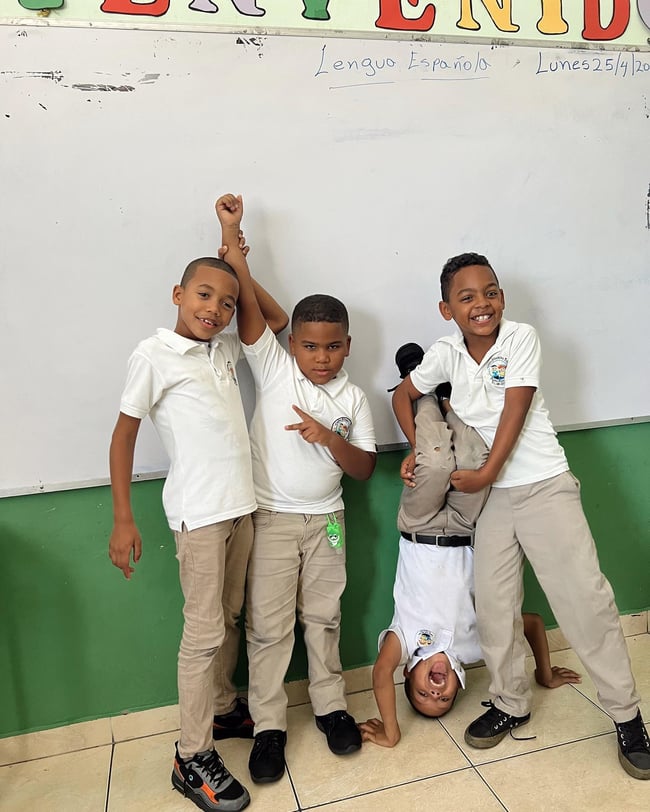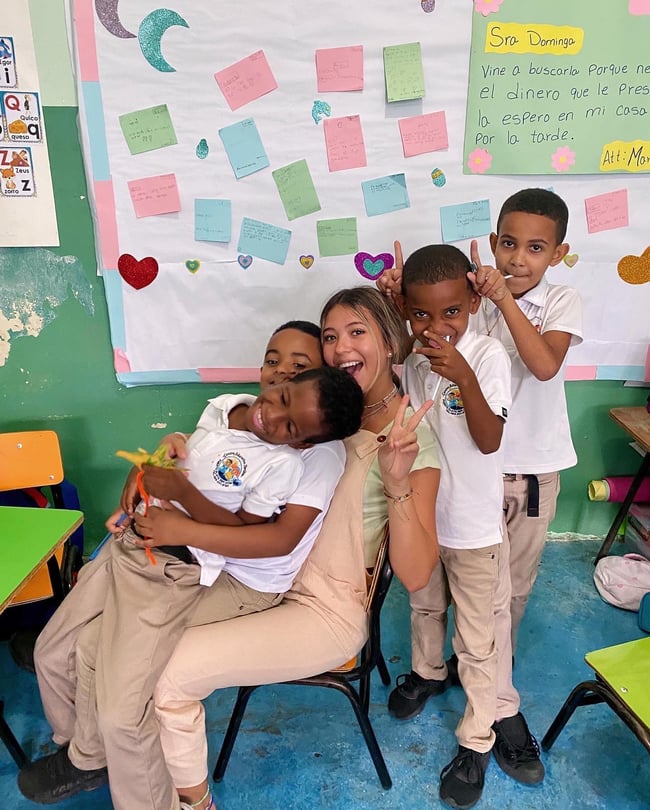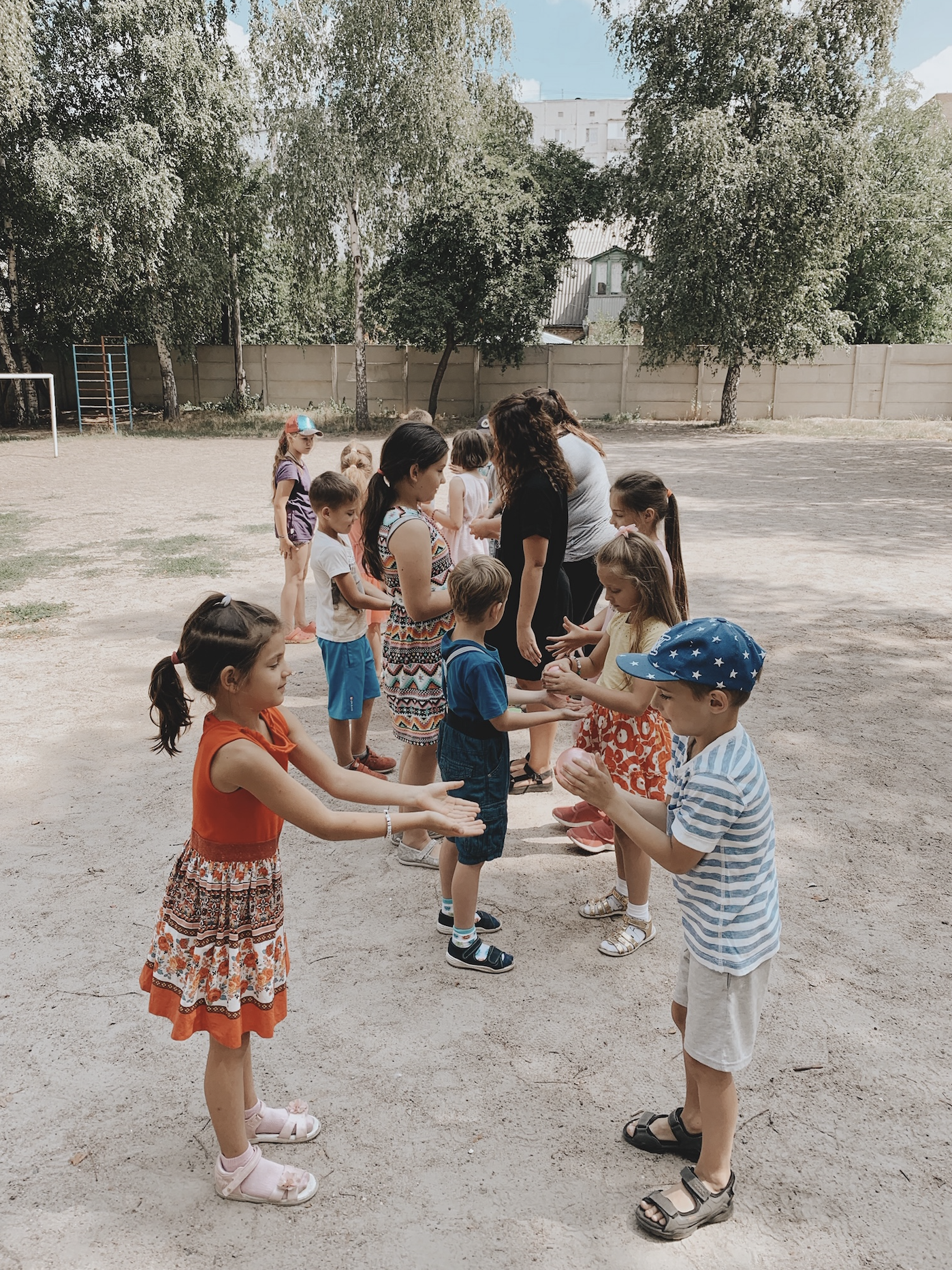
Oh my, the kiddos you will be teaching can be C-U-T-E. But even if they are the most adorable kiddos in the classroom, they can still difficult. No matter where you’ll be teaching, knowing how to love the troublemakers will make your semester a whole lot better.
When I was a spending a semester living abroad as an English teacher, I had a hunch one of the rowdy boys in my class was going to be a handful. From the first week of teaching, I could see him squirming during class and wasn't speaking English to a gang of rowdy friends even though "English only" was a heavily enforced rule. I knew if I didn’t find a way to love him, it was going to be a tough semester.
I can almost guarantee you will have at least one kid in your class that you will have a difficult time handling. Maybe your personalities clash, maybe he doesn't listen to the rules, maybe she spends her whole ILP time talking ... just plan on having favorites and plan on having students you might not get along with in your class ... and that’s okay!
Hopefully knowing that you're not the only one (plus getting some help with those troublemaking students) can help you handle things, all semester long.
Hear A Couple Of Stories
Get Some Help In The Classroom
Some Tips For You
Hear A Couple Of Stories
One From My Class
Remember that kid I knew was going to be a troublemaker in my class? I was 100% right. He was pretty difficult to deal with all semester long. Jordan was loud and had a gang of friends that followed all of his rule-breaking tendencies. This group of boys were in my homeroom which meant I typically started and ended my day with Jordan and the gang. He had a tendency to never listen and sabotage whatever cute Arts and Craft Project I had planned for the day. There was a lot of shouting, some spitting, and even some pushing when it came to how Jordan reacted to English class. Trust me, teaching this particular student was so hard.
Even though I had more hard days than easier ones with Jordan, I made it through the semester. Through lots of trial and error, there were things I did that helped me last the semester. Jordan ended up LOVING Shop activities. He loved the science part of it, and once he felt connected and excited about the end product, he was a lot more cooperative. Not perfect, mind you, just a little easier on some days when he got excited about building something. It was still really hard to get him involved in other teaching areas like Drama or Arts and Crafts, but having at lest a few easier days with Jordan helped move the semester along.
One From A Friend
Here's a story from Kat G, who's volunteered with ILP a couple of times:
Some From The Dominican Republic
Alumna Sierra E. had this to share from her time volunteering in the Dominican Republic:
"I definitely have stories about the kids. There was this one who sometimes ran out of the classroom MID-LESSON and took laps around the building and I was always SO stressed about what to do because I couldn't leave the other kids to run after him. I do remember that as soon as I stopped getting angry and frustrated over it I felt way better about it. The kid always came back, he just needed a little run to get his energy out I guess."
Get Some Help In The Classroom
Remember, each ILP group is set up with a Head Teacher who has taught on ILP before and may have some helpful tips. You also have access to your ILP representative and your ILP Project Manager, who also have teaching experience to share. In short, you're never alone! Here are some of the top tips from ILP alumni:
Let Them Sit Next To You
Maybe not the answer you were expecting, but having your most troublesome students right next to you lets you work more with them one-on-one (we talk about that more in a minute). They may be better behaved if they know the teacher is keeping a very close eye on them. Or some may be acting out because they are desperately craving your attention. Instead of a big production by them throwing a fit to get your attention, sitting close allows you to lean over and help, support, and compliment (without the need for a big fit).
If that doesn't work, try monitoring the classroom by walking around while your class is working. Have a tendency to hover around the students that typically cause problems and see if that issue irons itself out.
If that’s more distracting, your ILP Head Teacher may be able to take them out of class for a moment or sit with them during a particularly difficult day.
Work More One-On-One
I had one cutie in my class that had a hard time following instructions, which I felt was ruining my whole lesson, day-in and day-out. But as I got to know him better, I realized Garrett was just a very creative little kid. He threw a fit because I gave him 3 pieces of tape, but his creation needed 7. He didn’t like relays, because he’d rather make up his own relay rules. He had a hard time sitting still and following the order of things which got frustrating in a group-mentality ... I wished he would just follow the rules like the rest of the class instead of sabotaging my lessons.
But that wasn't the case at all. He was just a creative kid who wanted room to be more creative in ILP classes. Once I realized that he wasn’t trying to sabotage my lessons intentionally, he was easier to handle. I started having more creative lessons so Garrett could have a good time and I could have lessons that didn’t need to go perfectly. I work more with him one-on-one so I could understand where he was coming from when he demanded extra pipe cleaners for his craft.
Eliminate Distractions
If seats and desks are close enough to tap the windows to get the attention of friends outside or close enough to reach and tug at your wall decorations, restructure the sitting arrangement if you can. Don't be afraid to work with your Head Teacher or Local Coordinator at the school about rearranging the seating chart ... or implementing a seating chart if you think that would help.
When I was teaching in Asia, the students spent time during class to swap pencils and erasers ... the solution? I worked with the local teachers at my school and had the students select one pen and one eraser to use during my lesson. Then, there was no need to zip open pencil pouches and spend time chatting with friends while you debated which eraser set to use or which pen you were going to use that day. Water bottles were also distracting; kids would splash each other or shut their lids loudly when classmates were talking. Suddenly students got a drink before class and after class, and that was it. No more water bottles sitting on the desks.
There are times when the most difficult kids are being difficult because they are being distracting or are distracted. By doing what you can to cut down on those distractions, you may have a less disruptive class that's more inclined to listen to your lessons.

Some Tips For You
Go With The Flow
When I was teaching a class in Europe, everything was going wrong. We had plans to make bird feeders (cute, right?) and the kids were going wild. Half weren't listening, the rowdy kid in the class had hoarded all of the supplies, and then to top it off, I spilled the entire container of bird seed all over the carpet.
At that instant, every kid looked over at me to see how I would react. I could see that little troublemaker, Philip, start to laugh (which believe me, wasn't helping how I was feeling). But then I just started to laugh too ... and soon the whole class was totally busting up. Running with that massive mistake in class smoothed over the drama and created quite the talking point. The kids thought the whole thing was hilarious and actually got the rest of the class on track. I wouldn't count that bird feeder lesson as my most successful, but going with the flow is pretty essential tool to make sure most classes don't end up as a total train wreck.
Find Your Patience
This will mean different things for different teachers. For me, focusing on the things that were going well helped me balance out the things that were going horribly. For a friend of mine, she needed to count to five more than a few times when teaching her hard classes. Another teacher I knew did better when her Head Teacher stood in for a section of her class just to reinforce some of the rules. Whatever helps you be more patient with your students is going to be a key difference in how you react and adapt to situations and students in the class.
It Is So Worth It
Every semester, we see post after post about volunteers who initially commented on how hard their semester was ... but how it ended just so sweet. If you need a reminder that you're not alone in this, here are few quotes to check out.
"I will not lie to you: teaching is HARD. living in a different country is HARD. keeping a positive attitude is HARD. but every day has just a few of those moments where I feel truly joyful and grateful to be where I am." — Allie
"I was not ready to say goodbye to any of these cute kids. they taught me so much more than I could have ever taught them. the people of africa will always have a place in my heart" — Kamryn
"ohhh boy do these kids test me sometimes, but still, they are so easy to love (especially when they share their snacks with me) been here almost 2 months and it's enough to make me wonder how i'm ever going to live without the daily tickle fights, piggyback rides, and lesson interruptions just to tell me they love me :')" — Annie
"i am so thankful for the opportunity i had to love these kids and (try to) teach them english. they have truly changed my life. nothing compares to the sound of the kids yelling, 'teacha!!!!' as we walked through the school gate, getting attacked with hugs, & hearing, 'teacha i lOooVe you!'every single day." — Liz
... and that's just a few of the many, many posts we see every single semester.

Want more info about an ILP semester?
Come check us out on Instagram! We're regularly sharing what our volunteers are up to in the classroom and on vacation. Plus, you're always welcome to send us a quick message or whatever questions you may have about volunteering with ILP.

















